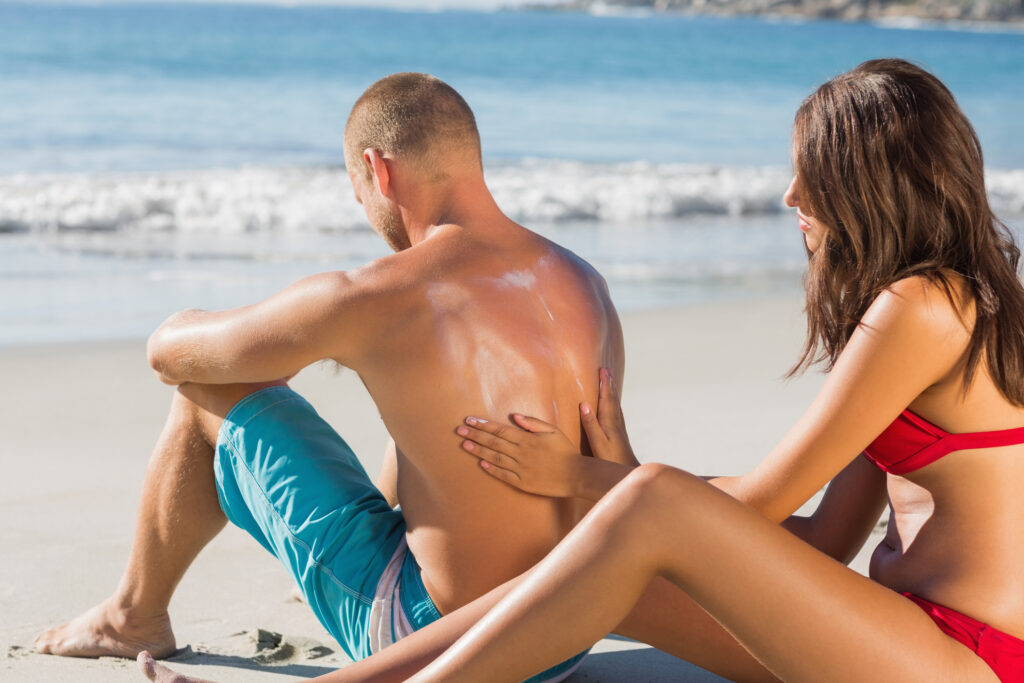
It’s always important to protect your skin from the sun’s rays.
It’s summertime, which means spending more time outdoors — whether at the beach, in the mountains or right at home. Many of us enjoy summer activities, but along with the warm weather and sunshine comes the risk of getting sunburnt and developing skin cancer.
However you enjoy your summer, it’s always important to protect your skin from the sun’s rays. To learn more about how to protect your skin and choose the best sunscreen, Jefferson Health dermatologist Dr. Elizabeth Jones provides the following advice.
What should we look for when purchasing sunscreen?
First and foremost, you should always look for sunscreen that’s labeled “broad spectrum” or mentions that it protects against both UVA and UVB rays. UVB rays cause sunburn and increase our risk of skin cancer, while UVA rays mainly contribute to skin damage that ages us, like wrinkles and leathery texture.
The second thing to look for is the SPF level — this is how much longer it will take untanned skin to redden with the sunscreen than without it. For instance, when wearing SPF 30 sunscreen, it’ll take 30 times longer for your skin to burn than with no sunscreen at all. Values between 30 and 50 will offer adequate protection. Higher SPF levels may appear beneficial when tested in a lab but, in reality, anything higher than SPF 50 won’t make a noticeable difference in sun protection.
It’s also a good idea to look at water resistance — these formulations usually cling to skin better if you’re in the water or sweating a lot.
For your face specifically, look for non-comedogenic or oil-free formulas, which won’t clog your pores and will help cut down on breakouts and rosacea flare-ups.
Is mineral sunscreen better than chemical sunscreen?
The choice of mineral or chemical sunscreen comes down to personal preference—both are effective in protecting against the sun, but they act in different ways. Mineral sunscreens use zinc oxide or titanium dioxide to act as a physical barrier to reflect the sun away from your skin. Chemical sunscreens, on the other hand, use chemical blockers to absorb the UV radiation like a sponge.
There’s a benefit to using mineral sunscreen for people who have sensitive skin because the skin is not absorbing chemicals. So, if you’re prone to breakouts or rashes, you may want to try mineral sunscreen. The downside is they have the tendency to leave a white cast on your skin because they’re not absorbed as easily—although more brands of mineral sunscreen are coming up with formulas to combat this.
Are there any dangerous ingredients in sunscreen?
The simple answer is “no.” You may have seen a recent report of benzene, a carcinogen known to lead to blood cancers, found in certain sunscreen and aftercare products. This isn’t an ingredient purposefully added to sunscreen, but more likely a contamination issue that occurred during the manufacturing process. The same issue was found with hand sanitizers during the pandemic.
While these products contained up to three times the FDA-approved concentration limit of benzene, the mere presence of benzene doesn’t automatically present an alarming risk. We don’t know how much, if any, of the benzene detected from these reports may be absorbed into our bloodstream. In addition, we are already exposed to small amounts of benzene throughout our daily lives as it’s used in gasoline, rubber, solvents and cleaning products.
It’s still extremely important to continue to protect our skin from the sun, so if you’re concerned about carcinogens in sunscreen, you can refer to Valisure’s list of products in which benzene was not detected.
Ingredients in chemical-based sunscreens were also recently detected in the bloodstream after application to the skin. As a result, these ingredients are currently being reviewed by the FDA, but there is no proven harm to humans at the present time.
How much sunscreen should we be applying, and how often?
The amount of sunscreen you apply is just as important as the type you use. Many people don’t apply enough to protect their skin. You should be using a quarter teaspoon of sunscreen on your face and about an ounce—approximately one shot glass worth—for the rest of your body. This is why I don’t recommend spray-on sunscreen, because the layer of protection that it provides is usually too thin. If you’re planning to use this type of sunscreen, I recommend spraying two layers.
It’s also important to reapply sunscreen every two hours if you’re inactive and every hour if you’re sweating or swimming.

People with darker skin can still get skin cancer, and it may be even worse because it can be harder to detect and is often caught at later stages.
Do people with darker skin tones need sunscreen?
There’s actually a huge misconception that people with darker pigmented skin don’t have to use sunscreen; however, everyone is vulnerable to the sun’s harmful rays. People with darker skin can still get skin cancer, and it may be even worse because it can be harder to detect and is often caught at later stages. Using sunscreen lessens the risk of sunburn, skin cancer and premature signs of aging like wrinkles or discoloration.
From an aesthetic standpoint, those with darker skin may prefer chemical sunscreens to prevent the white cast mineral sunscreens leave behind. Some companies are creating “sheer” or “invisible” formulations of mineral sunscreens to reduce the white cast. And there are also some brands that have started to release tinted hues of sunscreen, which can accommodate many different skin tones.
At the end of the day, everyone should be wearing sunscreen to protect their skin. The best sunscreen is the one you like wearing and makes you feel good!

